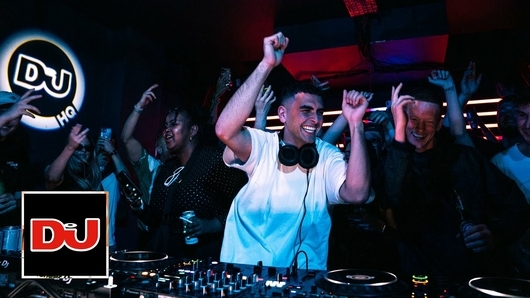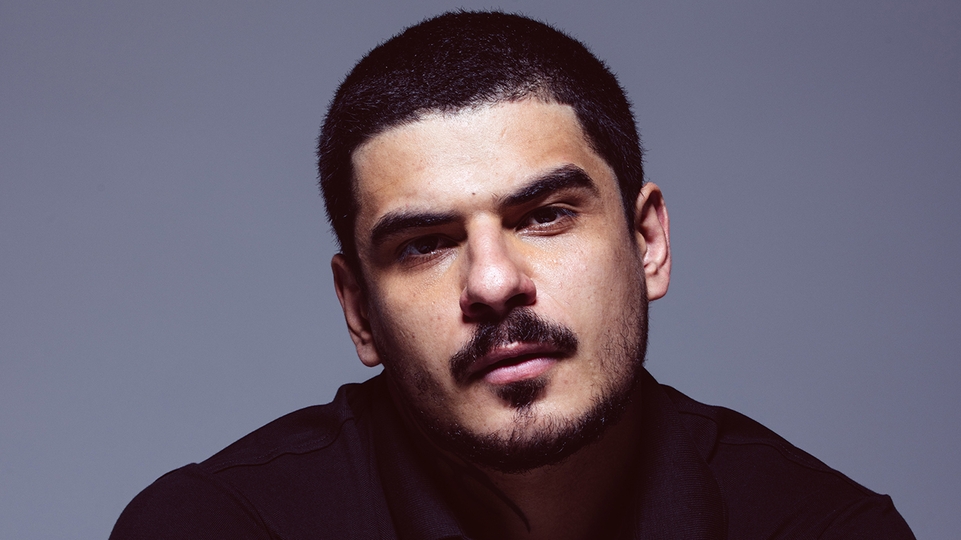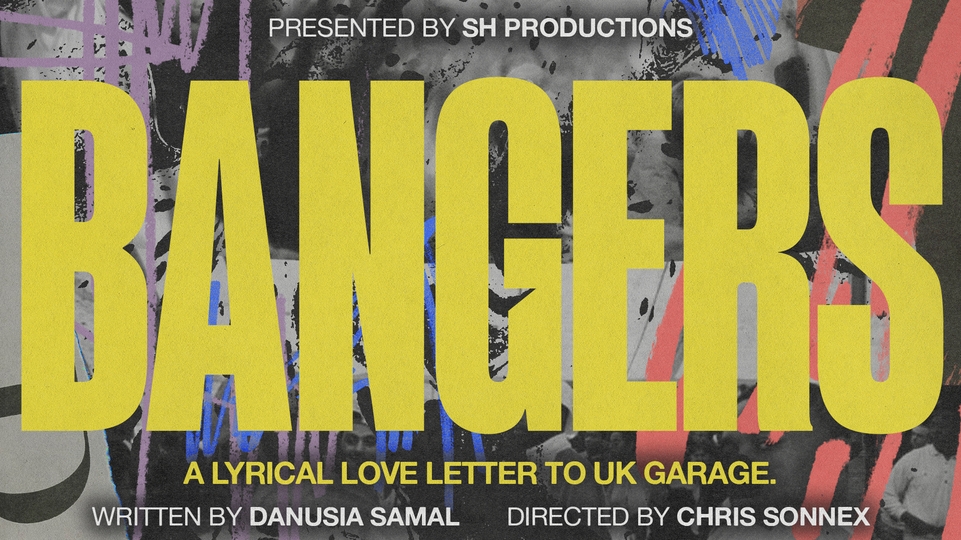
Sammy Virji: global garage phenomenon
When Sammy Virji's DJ Mag HQ set went viral last year, it changed the course of his career — but this is no overnight success story. His early bassline explorations and vibrant UKG cuts had already laid the groundwork for his global takeover. Nathan Evans learns more
"It’s scary, to be honest,” says Sammy Virji. We’re in a quiet section of a particular peri-peri chicken eatery that the producer/DJ visits “three or four times a week”, talking over lunch about the seismic buzz he has received in the past year. “I’ve been working for years to build this thing, and then the DJ Mag set felt like it kickstarted it into a new realm. And it’s all very scary,” he repeats, the Latin background music juxtaposing his grave tone with a trite cheerfulness.
The set he’s referring to is his DJ Mag HQ performance from last August, a breakthrough moment that turned him into an international sensation. Go to any Virji gig now and the same fervent buzz from fans is there, but the volume has multiplied. The set was also the culmination of a run of hits throughout 2022 and 2023 that piece-by-piece cemented Virji as one of modern UK garage’s elite.
This sudden swell of interest is also why he’s distanced himself slightly from social media. “I get so worked up over knowing that I’m in the spotlight, so it’s been nice to have the lights off,” he says. In the eye of a storm of his own making, Virji has just removed the boards from the hit factory after a break from production and touring at home. Though he’s adjusting to the new conditions, he knows how to practise self-care and is ready to get back into the swing of creating again, coping through everything with his signature smile.
The past 18 months have witnessed a flurry of landmark moments for Virji. His tracks have been some of the most consistently in-demand in the realm of UK garage, producing musical moments that even the critical darlings of electronic music want a piece of — during the almighty link-up between Jamie xx, Floating Points and Daphni at this year’s Coachella, the latter opened proceedings with Virji and Champion’s ‘Hot In Here’ and chose ‘Shella Verse’ as the penultimate track of the set.
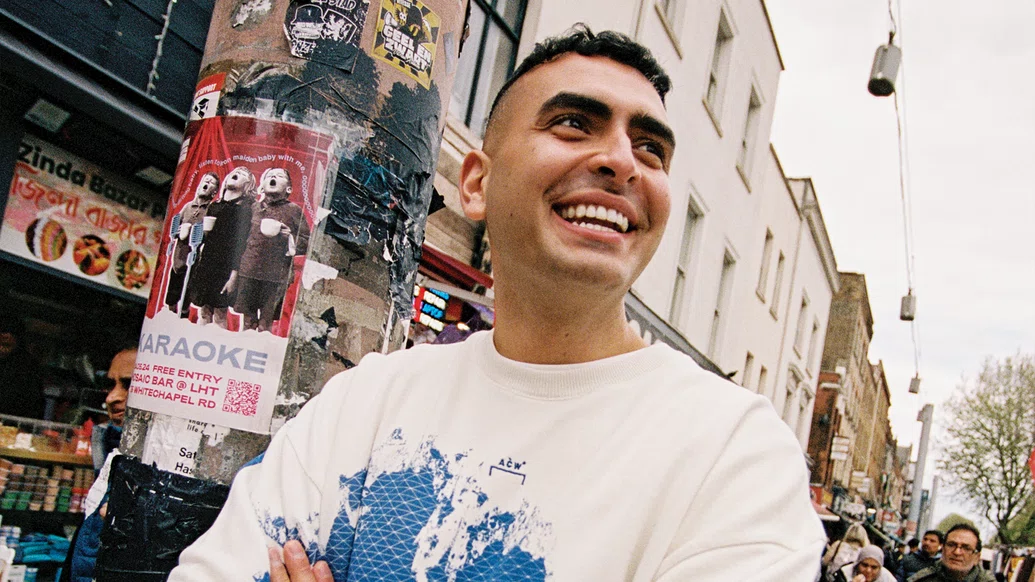
“Seeing Flava D do her thing... I remember watching her and thinking, ‘That is what I want to do.’ I was producing a lot at the time, but after that, I was grinding.”
Virji’s sound is part of the evolution of UK garage that some have tentatively dubbed “NUKG”, a new school that reflects the three-decade-old style back on the genres that were born from it — dubstep, grime, bassline — and even borrows some sound design from EDM. Within this cluster of artists, Virji’s music strikes as being giddy and soulful in equal measure, while never forgetting its duty to ignite the dancefloor. He brings together the rhythmic sharpness of Nice ‘N’ Ripe with the sort of crunch-crackle drums heard on AC Slater’s Night Bass imprint. The musical make-up mines the jazz chords of Disclosure and heart-stirring tones of Mike Millrain, and he lassoes vibrato vocals into a speedy swirl of coos, accentuating old 2-step vocal sampling techniques to a more animated degree. Still, Virji can surprise with either a face-melting drop that comes from a lifetime of listening to bassline, or a key change that glows like an old R&B number.
There’s a brute force to the summery vibe he creates — listen to a song like ‘Poolside’ and you’ll practically see the cocktail umbrella in the glass in your hand. Visually, he matches this cartoonish sugariness with primary colour-splashed artwork that you could see on the back of a graphic tee, and which, in the early days of 2015 to 2019, contained inexplicable images of Ainsley Harriott. “Meeting him would be a lifelong dream,” he says about the celebrity chef and meme subject. “He is such a good vibe. He’s smiley, he’s happy, he loves what he does, he’s a joy to watch. He’s a bit weird as well, and I love that.”
A similar demeanour comes across in Virji — cheeky, quick to laugh, and able to make even the loftiest of talking points as down to earth as describing a DJ set from his university days in Newcastle. But his boyish energy is crossed with a boyish shyness in our interview. “I’m not a big talker,” he says while awkwardly trying to keep his stack of napkins flush.
Virji’s journey into making the music he makes today cannot be condensed into one singular eureka moment, but rather a series of smaller realisations. Raised in the culturally rich city of Oxford, music was baked into his childhood — around the time Sammy was born, his father Fayyaz played trombone on ‘The Miseducation of Lauryn Hill’, one of the most critically and commercially successful albums in both neo soul and popular music. “He’s a hell of a musician,” Virji says, but is quick to add that music was never forced on him as a child — it came about of his own accord.
Young Virji started writing music on piano and guitar, and with access to his father’s record collection, he gravitated towards classic soul and disco. “All of a sudden, I got really obsessed with Motown, especially Michael Jackson,” he says. “[My dad often played] Latin music, African stuff, jazz as well...” He reflects this memory back on his own music. “I actually think there’s a lot of Latin influence in my music, Brazilian chords and rhythms...” It’s small wonder that he has dreams of one day creating a live show that incorporates elements of improv.
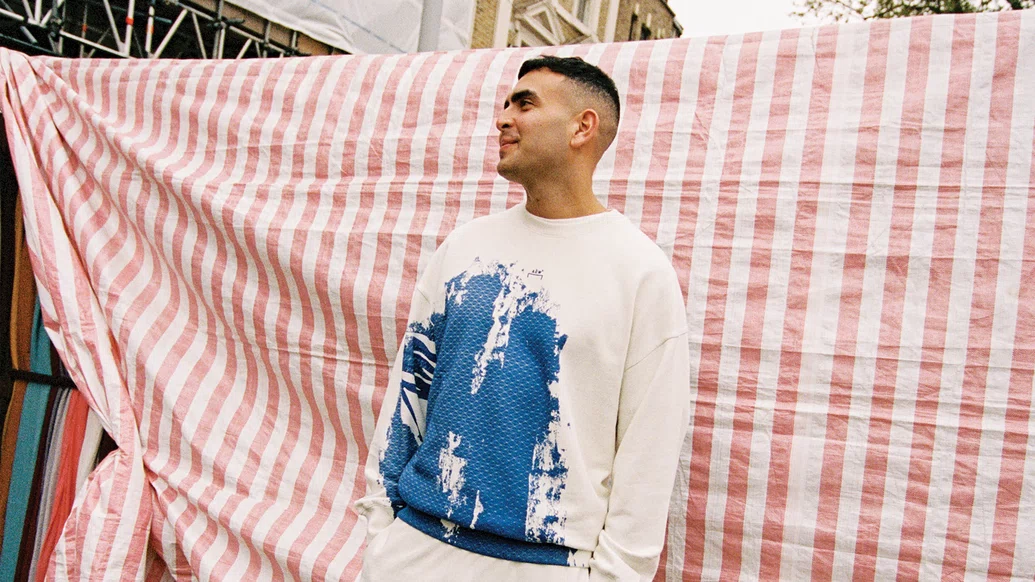
His entrance into electronic music was first-generation dubstep, and he found it on the primary school playground. “When I was in Year 6, my mate Jamie handed me a CD from Rinse — the sixth one, Plastician,” he recounts, showing his thousand-lumen smile. “There was just some absolute riddims on there! When I heard ‘3K Lane’ by Jakes & Joker, I was just in awe. That was the start of me getting into dirty tunes.” He spent years chasing down the same gurn-worthy moments that he heard on ‘Rinse: 06’ for himself, “mucking about” on Garageband and Logic, resulting in what he laughs off as “really bad dubstep”, as well as versions of the jazz music his dad would play around the house. “I was just making loads of random stuff,” he shrugs. A part of him wanted to follow in his father’s footsteps.
As a teenage dance music fan in the ’10s, his listening took him through myriad subcultures with little regard for staying in one place, instead borrowing a little from each. He omnivorously consumed UK garage, Niche bassline and EDM all at once; his first concert was liquid drum & bass posterboy Netsky. “It’s difficult to pinpoint how it all meshes together,” Virji ponders.
His early productions were strictly 4/4 bassline, creating thunderous breakdowns that carried one simple, raucous purpose. At their apex, these tracks sound like robots exchanging verbal warfare; a back and forth in an R2D2-like language over quick, bristly drums. “I think my sound developed when I was at uni in Newcastle,” he says, leaning forward to continue desecrating a plate of chicken wings. “I was getting into Flava D and DJ Q and Champion, all these people that had that bass sound which I loved; it was dubstep but with 4/4 drums.”
Flava D was the first DJ he saw in a club setting, altering the course of his ambitions away from his uni Biology course and towards music. “Seeing her do her thing... I remember watching her and thinking, ‘That is what I want to do.’ I was producing a lot at the time, but after that, I was grinding. Not consciously, more because I just loved doing it.”
At uni, Virji began DJing with a B2B alongside his housemate, best friend and fellow producer Yemi, in the now-defunct club House of Smith, where Room 3 was given to students to play whatever they fancied. “That set was sick!” he exclaims, elongating the last syllable. “I couldn’t use CDJs then, so I used my little controller to play grime and garage and bassline.” The pair would hone their DJ craft intensely by playing to a vast range of crowds in quick succession. “We were DJing together about four times a week,” he says. “We were taking everything we could get: R&B nights, house nights, bait music... basically because we were students without any money.”
In the meantime, Virji became more familiar with many northern regional dance scenes, from Newcastle makina and North-West donk to the Sheffield bassline scene that held names such as Dr Cryptic, Deadbeat UK and Forca. The latter scene was a key inspiration to Virji and in capturing its snotty, caustic electronics, as well as the swing from Niche bassline, he began to blend the cosmopolitan polish of London garage with the more extreme sounds he found up north.
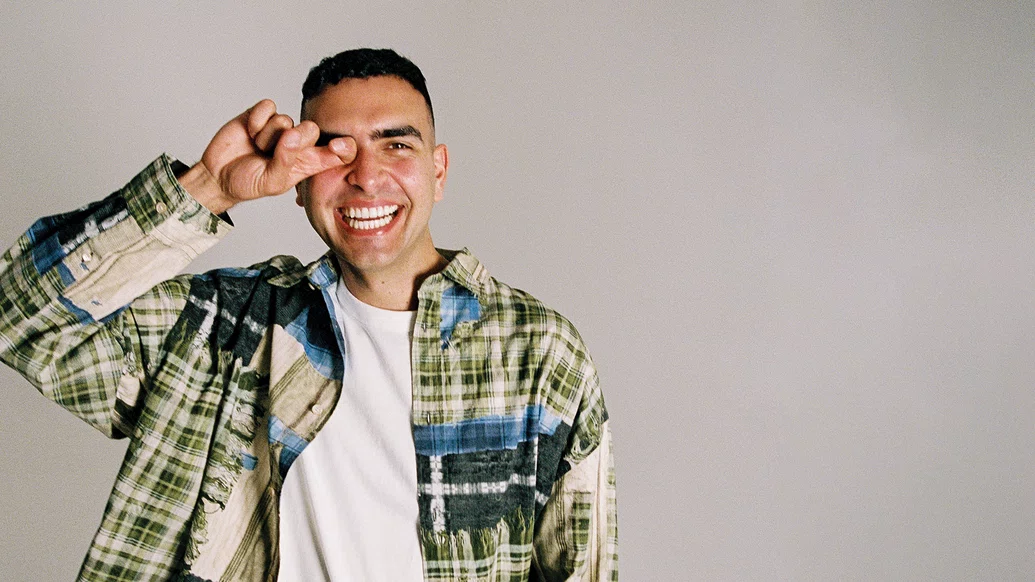
“I made a bootleg of Darkzy’s ‘One Dance’ bootleg — a bootleg of a bootleg — and it blew up in the group, and then it did really well on YouTube.”
By 20, Virji was starting to get noticed for his productions, even getting his first label release courtesy of Dr Cryptic. It was around this time that he was regularly posting on Lengoland, a Facebook group dedicated to bass music which ran between 2017 and 2021. Producers and enthusiasts alike would share releases, works-in-progress (WIPs), events, mixes and memes, and it became the hub of a tumbling tide of bass music spurred on by names like Skepsis, Darkzy and Virji himself. “That’s where I had my first blow-up moment,” Virji recalls. “I made a bootleg of Darkzy’s ‘One Dance’ bootleg — a bootleg of a bootleg — and it blew up in the group, and then it did really well on YouTube.”
After seeing the reaction to that track, he set to work on another bootleg of sorts. Infatuated with Double 99’s iconic ‘Ripgroove’ sample of Tina Moore, he initially placed the vocal run over a par-for-the-course bassline drop. But in tinkering further, he elongated the vocals, changed the bass notes, sat back and thought, “Wait... that’s insane.” The track in question was ‘Never Let You Go’, and upon hearing it, he scrapped all other versions. “I felt like I outdid myself.” ‘Never Let You Go’, released in 2017, became a huge hit on SoundCloud (it currently sits at nearly 3 million plays), accelerating not just Virji’s career, but helping push this new era of bassline into the wider dance music consciousness. The track’s effect is so strong that six years on, it’s still played frequently — even without including Virji’s mandatory spin in every set. “There’s been very few sets where I’ve not played that tune. I still love that tune, because it’s still me now.”
Today, his music exhibits more variety in mood and aggression, anchored by swinging garage drums. Take a track like ‘Moonlight’, with woozy chords so infectious that it somehow still draws a kinetic response from clubgoers despite its laidback energy. “I think it’s because a lot of the elongated notes are in F-sharp, which is the best note to rattle a sub,” he explains. ‘Moonlight’ borrows heavily from the blueprint that his collaboration with another recent DJ Mag cover star, salute, ‘Peach’, laid down last year. Rather than multiplying the horsepower of both artists, ‘Peach’ surprises with what he describes as “unexpected from both of us”: a massage of speckled bass notes and cooing vocal harmonies that harness the power of the key change to its fullest extent.
“The session wasn’t going well,” Virji admits, reliving the exasperation. “We were both kind of stuck. I don’t know what happened. Through trial and error, it just accidentally happened to be this thing.” They finally landed on an idea and their excitement to hear the results with fresh ears was palpable. “When you make a tune and you know it’s good, listening to it the morning after is the most exciting,” he explains. “You can’t wait to hear how it sounds.” Still, sleeping in salute’s studio that night, Virji saw an opportunity to have some fun. “When I woke up, I just thought I’d prank him by making another version with the same build-up and then make it as bad as possible. I got him good,” he laughs.
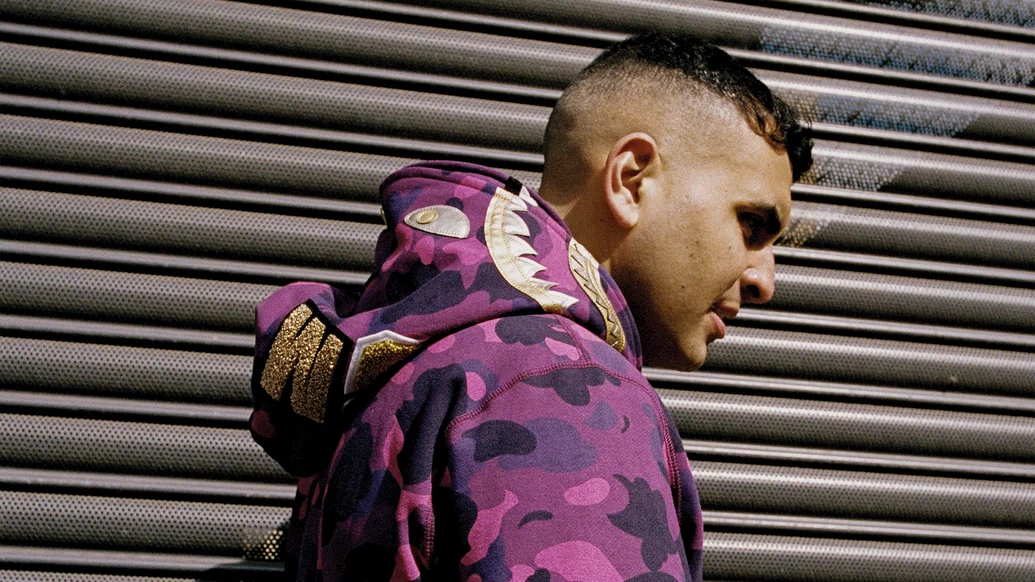
Throughout our conversation, he returns multiple times to a core belief. “With [dance music that is] just a bass drum and a hi-hat going for a long time, I do struggle to resonate with that. It’s not telling me anything,” he stresses the last phrase. Even with the many “wobbly bass lines” he has chimed with over the years, he strikes a musical connection with the narratives behind them. On his 2,500-song-strong USB, he has a 1995 gabber bootleg by Riot Nation titled ‘Abba-Gabba’ that takes a hit from the Swedish pop group and bolts on a violent high-tempo breakdown. “I actually do like gabber... You can tell that’s got stories behind it. I don’t know what, but it does,” he chuckles. To Virji, music is as valuable as the tales, both real and imagined, that are put into it.
Virji’s push for musicality was sparked by a yearning to get closer to the music he was raised on, like saxophonist Michael Brecker and the work of Quincy Jones. You can hear it in the aforementioned chords and key changes in his work, as well as horns, which are sprinkled throughout his discography in the form of a garnishing trumpet phrase or croaking tuba sub-bass, each one a small tribute to his father. Having a trained musician as a parent could bring some internal pressure for an artist, but Virji stresses this isn’t the case. “It’s in his nature to be very supportive. He’s really happy for me,” he says. What does his dad think of his music? “He loves it!” Sammy exclaims. “Even with the bassy stuff that I make, he loves to listen to it. I remember showing him Off Me Nut Records; he’s very open minded and he loves the silly sounds. He loves it all.”
This desire was partly why around 2018 to 2019, he transitioned away from bassline to focus on UK garage. “When you get embedded in that [bassline] scene and develop a fanbase there, it’s difficult to throw melodic stuff at them,” he says. Searching for the ability to grow as an artist, opportunity came in the form of a Facebook message from Kiwi Rekords founder Conducta, who wanted to run a release. Integrating into Kiwi as the label rose in prominence, Virji would release tracks such as ‘Shapes’ and ‘Whippet’, which carried a lighter sound with a sense of glee that felt more carefree than mischievous. Given the risk of upsetting an insular fanbase, making the jump must have felt daunting. “It didn’t feel wrong,” he replies. “With Kiwi, it felt like an opportunity had come along, so it was the right thing to do. So I wasn’t nervous about it at all. I needed to do that.”
To his surprise, even the bassline scene warmed to his new sound, providing unity between the scenes. As if returning the favour, Virji still finds ways to flex that muscle. “I still like going really in on sound design sometimes and making heavy stuff,” he says. Naturally, this leads our conversation to his recent remix of Hamdi’s ‘Counting’, and not just for how he throws down an unexpected killer drop. Where his heavier tendencies were once a regular feature, they now hide in his arsenal as secret weapons to deploy. Searing and propulsive, the reaction to the ‘Counting’ remix at Virji’s DJ Mag HQ set was so visceral, it may have cracked the bedrock had he not wheeled it back.
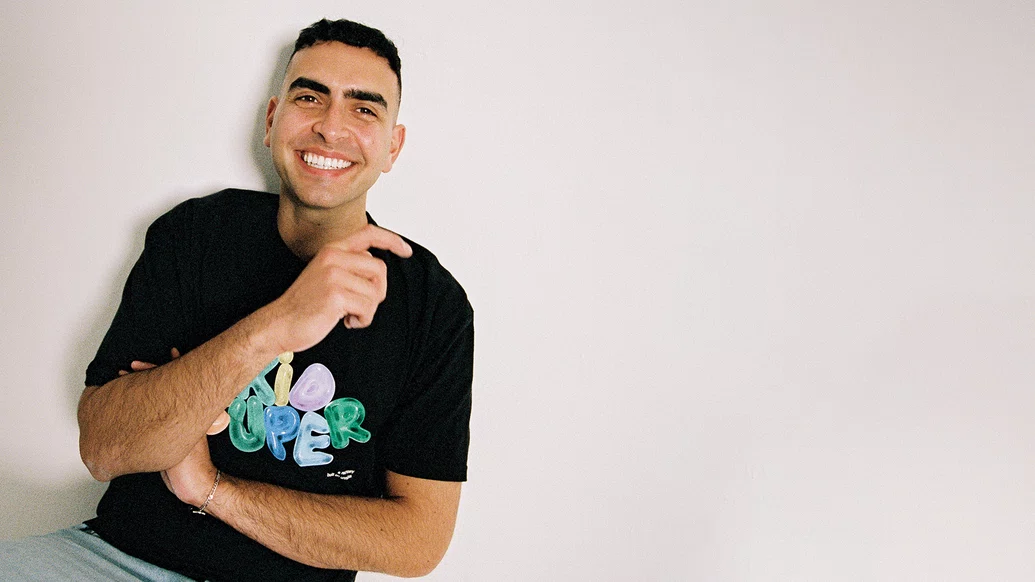
“It would have to be the Skeptic ‘Join Hands’ edit where we all linked arms. That felt like a moment. Everyone’s locked in and there was this community that had formed. That actually could be one of my favourite sets ever.”
“The whole DJ Mag thing, I really, really didn’t think the reaction would be that good,” he says, still visibly baffled. “I was hoping it would be good, but I didn’t expect that at all.” But his disbelief in the outcome belies the extent of his plan to maximise the opportunity. “Having a live stream like that is what really gets the best response online now. I knew that it could be an important moment and that I might not get this opportunity again, so I tried to make it the best that I could. I had never prepared so much for a set in terms of making new tunes,” he says. Flanked by his good friend Cunning MC for emotional security (“If no one else gassed me up, I could count on him gassing me up”), he proceeded to turn the tightly packed studio into a chorus of cheers and a sea of limbs.
From the very top, Virji supplied purpose-made exclusives, like a remix of Unknown T’s ‘Goodums’ that pairs the rapper’s deep, cold drill raps with a sweet-sour confection of synth stabs that bounce around the room like a tennis ball. The genesis of the remix was a demo called ‘Beautiful Dreamer’, from which Virji created a mashup with T’s vocals. “I love working around vocals, and Unknown T is a cheat code rapper,” he says. Alongside an unreleased remix of Peggy Gou’s sun-seeking ‘(It Goes Like) Nanana’, which Virji reveals uses his voice for the first time for the chord section, another bootleg-style remix provided the liveliest highlight of the set: ‘Shella Verse’. A long-sought-after dub turned official release, Virji samples a 2018 SBTV freestyle from Flowdan (another “cheat code rapper”), adding a plump garage bassline, Notting Hill carnival horns and explosion effects that could be ripped from Charlie Sloth’s soundboard.
For the set, Flowdan made his way through the crowd to perform the song and freestyle over grime and dubstep instrumentals. “At that particular moment of the video, the second drop of ‘Shella Verse’, he goes ‘Yo, listen, you hear that?’” Virji remembers, a reference to Flowdan’s hook on Skrillex and Fred again..’s ‘Rumble’. “I was so gassed that my arm elongated about three times longer than usual, way more gassed than anyone else in the room.”
Mixing almost 50 tracks in just over an hour, the set was an example of how Virji’s DJing mirrors his production style, feeling spontaneous even when the elements are very musically considered. He’s a big believer in mixing in key, and credits it hugely for the quality of his sets. “Sometimes people can’t tell why [my mixes sound] good, but it’s just mixing in key really. It’s so important, but I think it’s also my downfall because I get really obsessed over it...” he says, launching into a detailed breakdown of how minute changes in BPM correlate with shifting semitones. His compulsion to deliver the best sounding set possible conspires with muscle-memory actions to create unique quirks in his mixing style, such as unexpected key changes. “When a tune drops, I always take the Master Tempo off,” he explains. “You get more quality through the speakers; if you leave it on, it just doesn’t sound as good. If you hear my sets now, you will often hear a little key change. It might sound weird to some people but I just have to do it.”
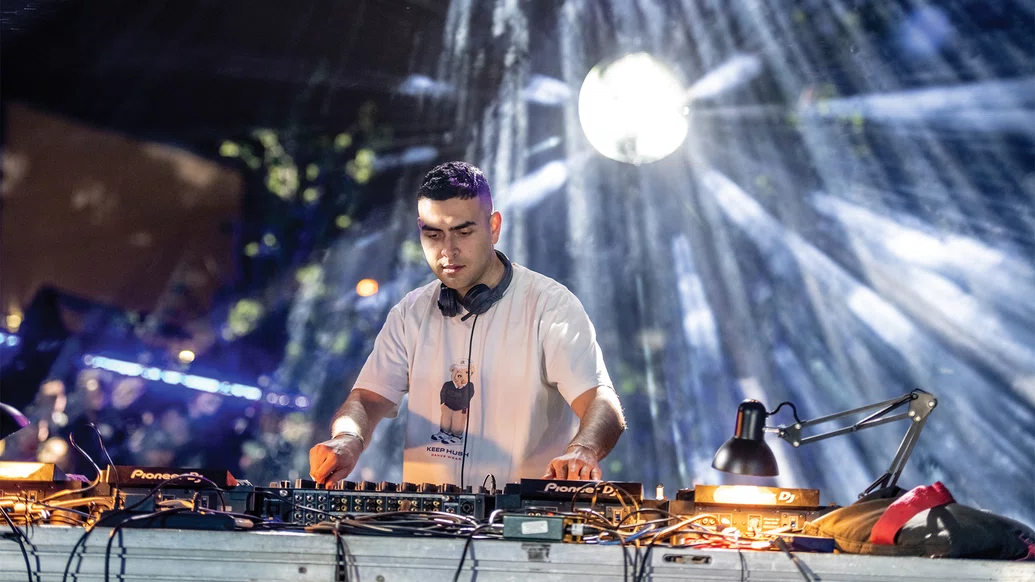
Virji’s DJ Mag HQ set encapsulates the endless possibility for strange and special moments to unfold on the dancefloor, and clips spread across the internet like wildfire. During the VIP edit of ‘Peach’, the sweat in the air set off the fire alarm, and when Virji wheeled up ‘Hot In Here’, he did so with a rubber fish in reference to a pescatarian uni friend. And Virji’s favourite moment? “It would have to be the Skeptic ‘Join Hands’ edit where we all linked arms. That felt like a moment. Everyone’s locked in and there was this community that had formed. That actually could be one of my favourite sets ever.”
Fans call the instance of seeing their first Sammy Virji set “losing their Virjinity”, and recent tours in the USA and Japan have meant that many more can say that. “I was surprised with how much they know [of the UK garage culture],” Virji observes. “It’s easy to be into someone because they’re bubbling up, but for them to know old-school tunes, and producers like Bakey and Main Phase, it was really cool to see.” In Japan, the enthusiasm for UK garage was feverish, as clubbers battled through the sweltering clubs with a seemingly unlimited amount of energy. “I don’t know what it is, but they’re just so up for it. It’s like they’ve not been let out for ages, like in England when Covid [restrictions] had been lifted and it was that first rave back. It was like that all the time there.”
As much as international crowds are eager to load up gunfingers just as the Brits do, they also remix UK garage culture with their own local traditions, Virji explains, leading to one-of-a-kind mashups of traditions and cultures. Japanese garage adds an aesthetic informed by, among a host of other cultural touchstones, anime and video game soundtracks. “Texas is the biggest culture shock,” Virji says. “People come to the raves in cowboy hats and vibe to UK garage. It’s insane.” It’s a sign of the genre’s strength that it can be exported and assimilated into local scenes, allowing it to consolidate and develop new ideas.
UK garage’s current momentum would arguably not have been possible without the vision of Conducta and his Kiwi Rekords outlet. Virji, as someone who passed through and inherited its candy-coloured remastering of the style, says he owes a lot to the label, which also platformed Oppidan, Sharda, Hamdi, Bklava and more. So when Conducta told Virji that he was planning to shut down Kiwi this year, he felt sadness, followed by pride. “Kiwi has a serious place in my heart,” he says. “It was the thing that allowed me to go and be a bit more expressive, go down my musical route. It’s really sad to see it go, but...” Our minds meet at the same phrase. “It completed its mission.” The Sunday after our interview, he and Conducta play back-to-back to close out Kiwi’s final party in London.
For the foreseeable, Sammy Virji will continue to pilot his ship in the same direction. A new tune with salute and Joy Anonymous is in the vault, and he’s planning to reach out to some of the names that have been rinsing his tracks out. “I’ve been in talks with Daphni about doing something, and I messaged Four Tet when he was working on his album,” he says, implying the latter was too busy at the time. “Hopefully I can get to him at some point.”
He’s also gearing up for a residency at Ibiza’s Amnesia this summer, another rarity for a UK garage DJ. With the amount of success he’s seeing, he’s choosing to remain entirely open to where his career will go. “I deliberately don’t write personal goals like, ‘I want to play this festival by this time’,” he says frankly. “It treats it like a business or a job if you think that way. I’m putting all my energy into making the best music that I can, and what’s gonna happen is gonna happen.”

